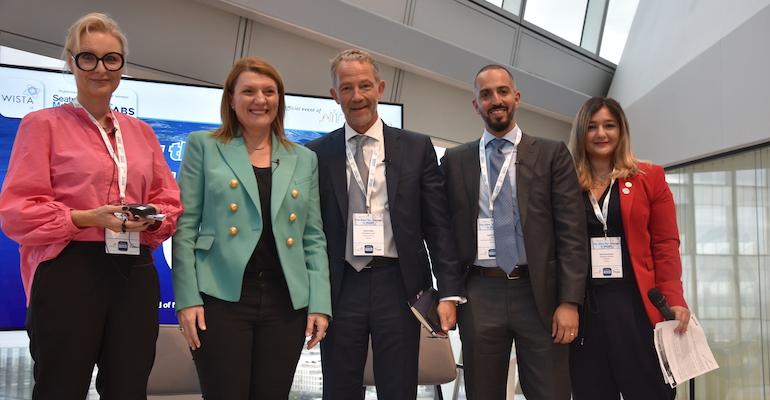This was one of the stand-out conclusions of two panel sessions held earlier this week at a joint WISTA UK and Seatrade Maritime event, The time for Change is NOW, held at Informa Market’s Blackfriars headquarters during London International Shipping Week (LISW).
In a Motivational Keynote Address given virtually by Nancy Karigithu, Kenya’s Ambassador and Special Envoy for Shipping and Blue Economy, she cited maritime labour union figures that of shipping’s estimated workforce of 1.89 million, only 24,000 are women, less than 1.3%. This comes as the sector faces an acute shortage of around 90,000 officers, she said. If we are to improve this, shipping needs to up its game, attract new talent, mentor young people, and support their development.
In the first session, Green Roles are the future moderated by Monica Kohli, President of WISTA UK, the panel was made up of Commodore Melanie Robinson CBE, Royal Navy, Sarah Kenny, CEO of BMT Group, H.E. Eng. Essam AlAmmari, VP Advisor – Regulation Sector at Saudi Arabia’s Transport General Authority, and Chuck Kemper, SVP and CHRO at classification society, ABS.
Robinson pointed out that even the small number of females involved in global shipping today has taken many years to build up. The focus must now be on today’s youngsters and a generation that has not been born yet, she said. They need to be inspired, encouraged in schools, and motivated by fine role models.
The panellists agreed on the need for urgency as shipping’s human capital becomes more strained. But young people, especially females, will not be attracted if they see no future and fail to identify with anybody or anything, they agreed.
The second session, moderated by Gina Panayiotou, Secretary General of WISTA UK, was titled Responsible Leadership: a CEO’s Guide to ESG in Shipping. Panellists included Elisabeth Munck, Global Sustainability Manager, IKEA Supply Chain Operations, Despina Panayiotou Theodosiou, CEO of Tototheo Maritime, Daniel Kaabi, CEO of Sea Horizon Offshore Marine Services, Dr Anil Sharma, CEO of GMS, who took part remotely, and Mark O’Neil, President and CEO of Columbia Group.
Munck said that companies need to set goals and targets and should not be held up by the complexities relating to the development of sound ESG strategies. We need to do more, she said, and we need to do so at speed. Theodosiou concurred. Supply chain sustainability could best be achieved by breaking projects down into manageable steps, moving in parallel possibly with separate teams, she suggested.
Listen to a podcast on ESG in the salvage sector
Kaabi stressed the need for the whole industry to collaborate. Charterers should encourage sound ESG development, he said, and young people’s ESG expectations have to be met.
O’Neil echoed this, citing a recent event organised by Columbia to attract students at the UK’s Oxford University. The company hired a wine bar and gave presentations on the positives of a career with Columbia. However, the main issue raised by the students, he said, was not what they could expect in material terms from a career at Columbia; their main concern was hearing about the company’s ESG framework. Developing ESG is not an option; it’s absolutely crucial, he said.
Sharma reflected on his company’s history. Before ESG, we had CSR, he said, and GMS has been working on these issues for many years, encouraging recycling yards to upgrade facilities, improve labour conditions, and implement better health and safety standards.
Now, there are new issues, Sharma said. Should we be building new ships, or should we be looking at extending the lives of existing ones? Either way, upgrades at a large number of recycling yards on the Indian subcontinent now mean that they meet IMO Hong Kong Convention standards, he said.
Copyright © 2024. All rights reserved. Seatrade, a trading name of Informa Markets (UK) Limited.
Add Seatrade Maritime News to your Google News feed.  |

